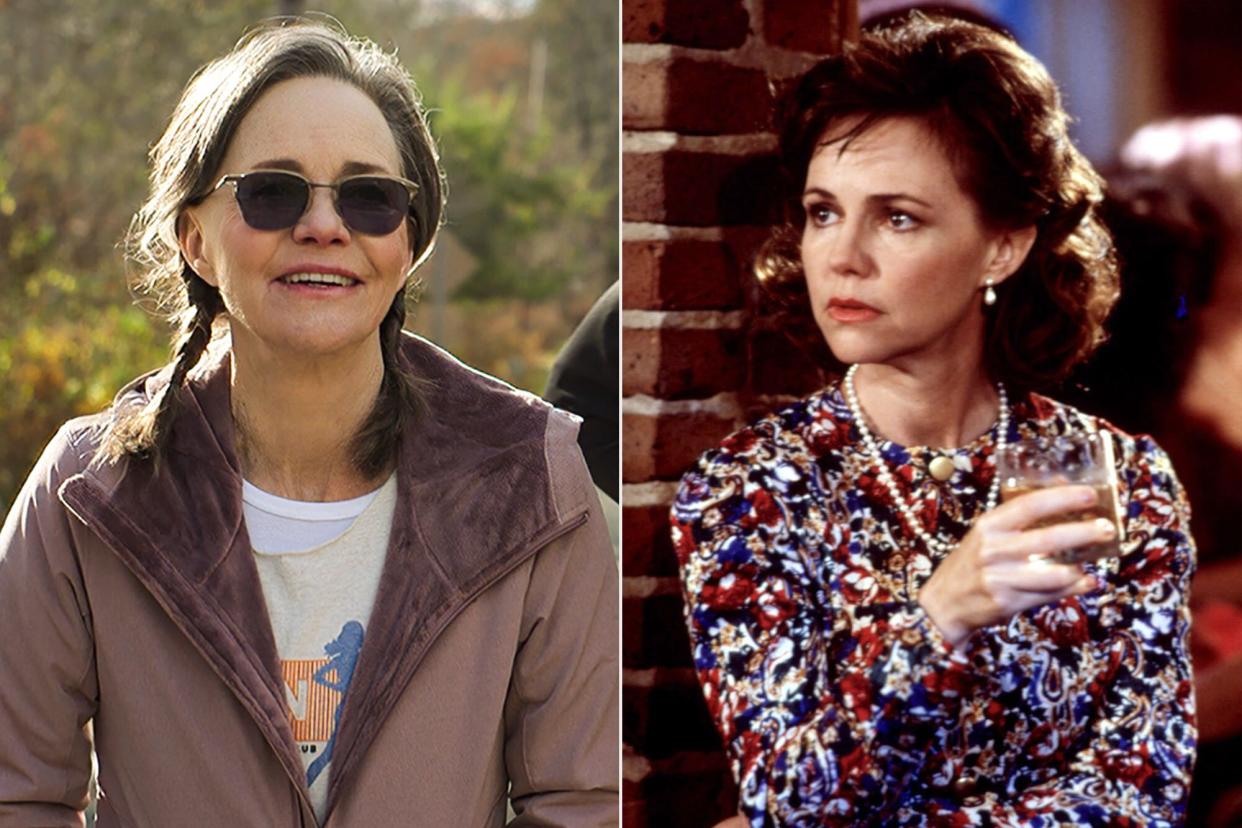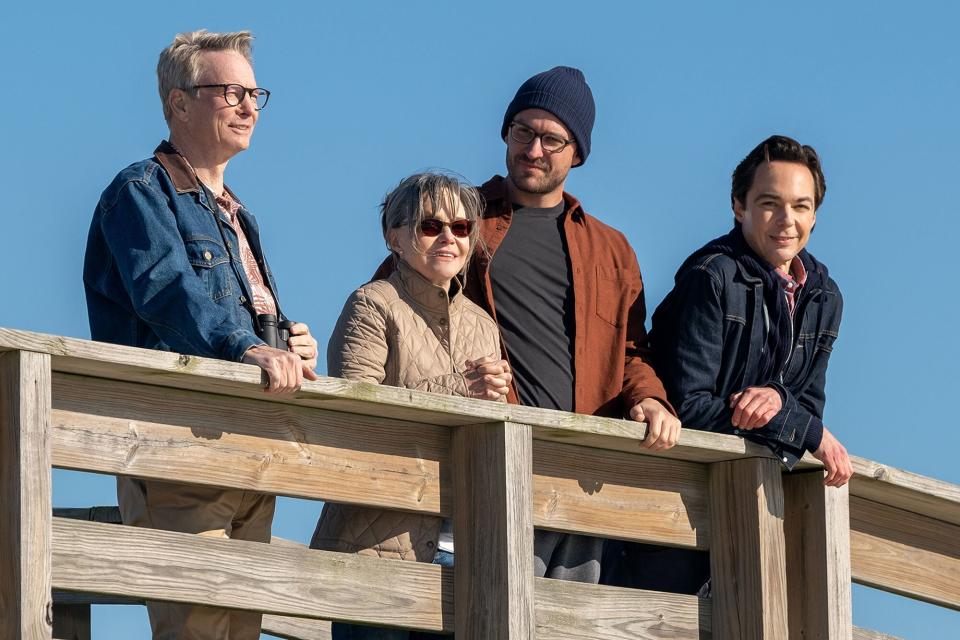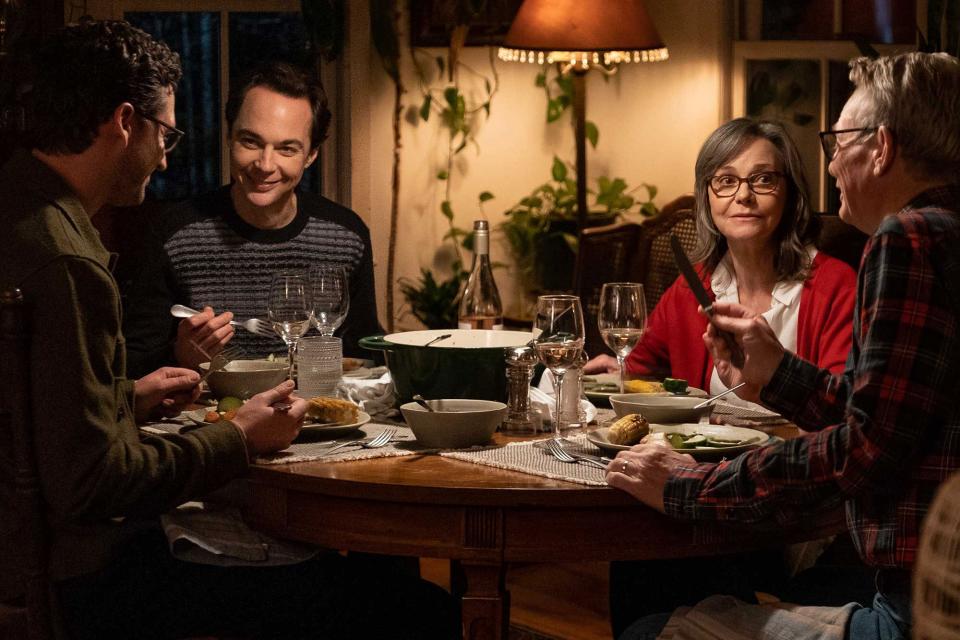Sally Field on the parallels between playing a grieving mother in Spoiler Alert and Steel Magnolias

- Oops!Something went wrong.Please try again later.
- Oops!Something went wrong.Please try again later.
Sally Field seems to have a knack for playing mothers who lose their children.
The actress, 76, delivered one of the most iconic on-screen monologues ever as M'Lynn in 1989's Steel Magnolias as she breaks down at the graveside of her daughter Shelby (Julia Roberts). In Spoiler Alert, expanding its limited release on Dec. 9, she lives through another family tragedy, saying goodbye to her son Kit (Ben Aldridge) as he dies from cancer.
"Emotional work is always hard," Field says. "But I knew that this wasn't like Steel Magnolias or many other things that I've done where you feel like you're slicing your wrists and losing years off your life because of how hard you have to work to get to these emotional places. The task was to stay away from it until it was ready to shoot, because it was just so there and it was so raw. The difficult thing [here] was to not feel it until it was time to feel it."

Focus Features; Everett Collection
So would Field call Steel Magnolias a harder scene to play? "You can't say harder," she demurs. "They were both acting challenges in my life. Steel Magnolias, that monologue is a great monologue. Every aspiring actor tries to conquer that monologue. It's full of everything. But you get in the car at the end of the day, and the best feeling is when you could go home and go, 'Okay, I did my work. I did what I knew to do.' Could you have been better? Probably always yes. But I did the very best that I possibly could in this day's work, and that's all there is."
Field re-teams with Brothers and Sisters showrunner David Marshall Grant and Hello, My Name Is Doris director Michael Showalter for Spoiler Alert, adapted from journalist Michael Ausiello's memoir about losing his longtime partner, Kit, to cancer. She costars as Marilyn, Kit's mother.
We called up Field to talk about heavy roles, improvising, and having to believably play a triathlete.
ENTERTAINMENT WEEKLY: How did this project come your way? Had you met Michael Ausiello at all through interviews?
SALLY FIELD: This came my way because I got a phone call from two of the people I love most in this industry or on Earth — Michael Showalter and David Marshall Grant. When they called together, and said they were doing a a project, I was like, "Whoa, the two of you together." They wanted me to be in it. I said, "Absolutely, I'm there. I'm in." And they said, "Well, at least read it first, will you?" I did, and it's such a lovely story about how hard it is to love someone, whether it's the parents loving each other, loving their child, or this couple.
Ausiello is a producer on this. How much did you turn to him for insight on Marilyn and Kit?
Not at all. I hardly talked to him. He was on the set every day, but, though it is taken from his memoir, I'm not playing his memoir. Marilyn and Bob (Bill Irwin) really do exist, thank goodness. But I never met them. I know they're very private people. We had to take what was in the screenplay and bring that alive to service the story we were telling of this love affair. My allegiance was not really in accurately portraying who Marilyn really might be. Was that exactly what happened? Who knows? Were those verbatim the words? Probably not, because we did a lot of improv to bring it to life.
I have found that if you're doing a character that really did exist — it's one thing if you're doing a historical character where people know what they looked like or how they behaved or how they sounded or walked or any of that — then part of your responsibility is bringing that person through you alive as much as you can, trying to replicate their voice or their walk. But I didn't have that requirement with this because they're people that are unfamiliar to the public. My task had to be to bring Marilyn and what was there to life within the context of the movie we were making.

Linda Källérus / FOCUS FEATURES
One of my favorite scenes in the movie is where Kit is backed into coming out to his parents after keeping it a secret for a long time. They respond warmly, in a fashion he's not expecting. Your youngest son is openly gay. Were you drawing on any experiences with him for that moment?
Well, all actors draw on themselves. Whether it be absolutely, specifically, or an awareness that stays there. But this was not my experience — what Kit went through as compared to what my life was, and what I went through or my son. So, I wouldn't say that it wasn't in any way, shape, or form in the mix because actors bring in their own existence whether they want to or not, whether they call on it or not. But this is very different than my life and what my son's life is like.
Was getting to depict that a motivating factor in signing on though?
No. [Laughs] You really can't come into a project with an agenda, you know? It's a lovely story about loving, about generosity, about compassion, and about family. With all of that, it struck me as something I wanted to do, even though I'd already said yes, I was doing it, whether I wanted to do it or not by then. But I didn't have an agenda. Like, "I wanna tell this story for people to see and go through some of the things that I have." You can't do any of that. It puts too much weight on it. You can't judge the story. You can't judge a character. You just do it, be that good or be that bad. You do your job.
You and Bill Irwin have this wonderfully lived in chemistry as this couple here. How did the two of you find that together?
Bill and I have a longterm friendship. He and I did a play on Broadway together many years ago. When you do a play on Broadway, you do your a performances month after month, and you really end up loving that person you were standing across the stage from, or despising them. [Laughs] You can't not love Bill Irwin. When it was him going to do this, it was such a great gift to me. We could just hit the ground running. We weren't replicating the kind of work we'd done on Broadway. We played two very different people, but because we know each other, we just could land. It was like barely rehearse and just begin. And there we were.
Speaking of hitting the ground running, Marilyn is a triathlete. We don't see her in a race.
Thank God!
But we do see her on these wintry jogs with Jim Parsons' Mike. Did you have to train or learn anything about running technique for those sequences?
No. I used to run a lot. It's probably why my knees are so very bad. And also because I'm x amount of years old now, and I have osteoarthritis, so all of my joints are hugely challenged. So the running stuff, thank God I didn't fall on my face. My knees were sleeved tightly to try to keep them from swelling up too much. But it was so fun to be out there in the country and the leaves were turning and it was icy cold. The camera would be way far away. And I would say to Jim, "Is the camera around? Are we even filming this?" But there was a lot of improv and great fun.

Linda Källérus / FOCUS FEATURES
Marilyn is a lovable busy body. As a mom yourself, was that something that came naturally to you?
Yeah. A lot of it wasn't there on the page. I've been here long enough to know how to fill the space with activities. Rarely do people in families just sit and look at each other. Unless there's something specific you're needing to know, you're doing something with your hands. I was always looking for the Marilyn that existed in activities.
You mentioned there was lots of improv in the jogging scenes. I'm not sure if there was elsewhere, but what's one or two things you found through improvisation that you're really happy with in the end?
In this film, so much of what Marilyn ends up with is stuff that Michael Showalter allowed me to find because I would reach a bump and I'd say, "Something's wrong. Something's not fitting with the logic. If that's who she was here, then how can she be that here?" One of the reasons Michael is so good is because he allows the space to find it. If you improv, sometimes the truth comes out somewhere from the back of your brain that you didn't even know was there. Certainly in the scene where Kit tells his parents that he's gay for the first time, Marilyn's reaction was improv for me. Michael let me do that.
Marilyn's goodbye to Kit in the hospital is improv, and Michael let me do that because I couldn't find exactly what she would say and not move into the territory of what the Michael character has to say. It's a hard place because it's a mother, and I wanted to say some of the things that Michael ultimately ends up saying to him. But in the film that would be me trampling on his territory. He has to own that spot. So I had to find something that she would say without tipping the hand of what Michael was going to say to him. There were many, many moments in this film that Showalter let me find where Marilyn is.
Related content:

